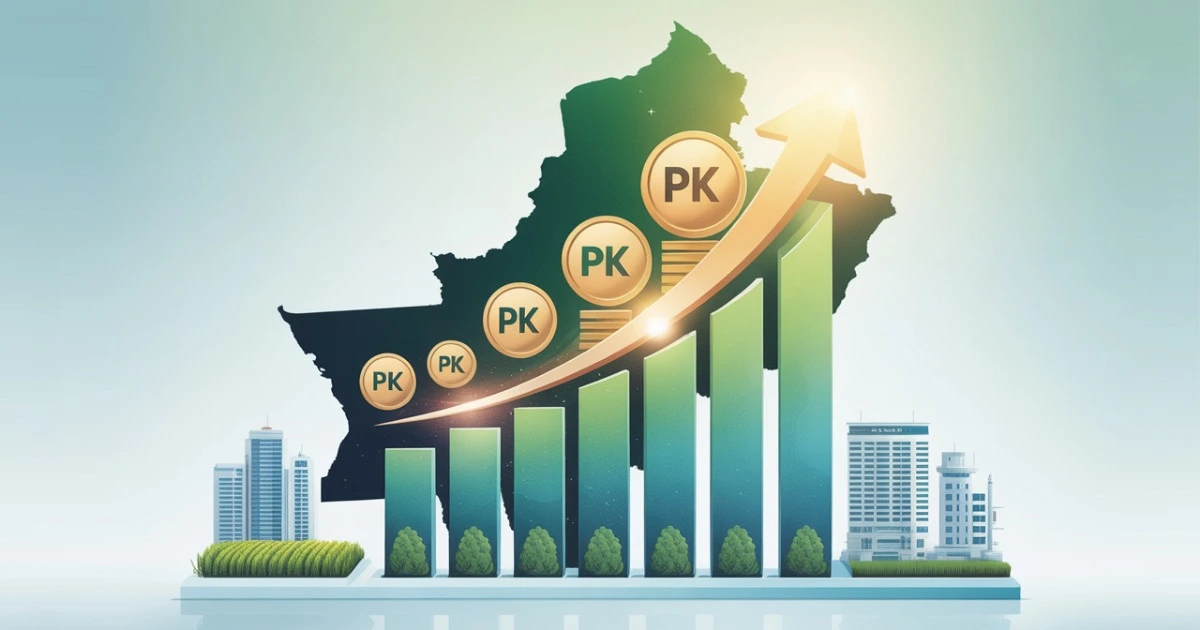Imagine standing at the crossroads of opportunity and innovation, where a young economy, strategic location, and a population of over 249 million converge to create a fertile ground for growth. Today, investment opportunities in Pakistan span far beyond traditional sectors. As the country’s GDP is forecast to grow by 2.7% in FY2025 (World Bank Pakistan Overview) or 2.5% (Asian Development Bank).Moreover, urbanization is reshaping demand: by 2030, Pakistan’s urban population is projected to exceed 99.4 million, or 40.7% of the country’s total, in 2030 (Asian Development Bank, Pakistan National Urban Assessment), driving growth in real estate, retail, and infrastructure. Meanwhile, sectors like agriculture, contributing a share of 23.54 % and growth of 0.56% to GDP in FY2025, are embracing technology, opening new avenues in agri-tech and value-added processing ( Pakistan Economic Survey).
Between July and March of FY2025, the Pakistan Stock Exchange’s (PSX) KSE-100 index showed impressive performance, climbing by 50.2%, from 78,445 points to 117,807 points. During this period, the index peaked at 118,770 points on March 20, 2025, while the lowest point recorded was 77,084 on August 5, 2024. Business Recorder
Pakistan’s Information and Communication Technology (ICT) sector saw a 17.44% increase in export remittances, reaching $2.283 billion during FY2024 (July to March), up from $1.944 billion in the same period last year, as reported in the Economic Survey 2023-24 released on Tuesday, brecoder.com. During the same period, ICT export receipts rose by US$ 541 million to US$ 2,825 million, a 23.7% increase year-on-year. Pak Economic Survey.
Freelancers also contributed an impressive US$ 400 million in foreign remittances, further energizing the digital ecosystem.Supporting infrastructure growth, telecom subscriptions neared
200 million, with broadband penetration growing to 59.8%, and cellular coverage reaching 91% nationwide. Pak Economic Survey
In short, whether you’re drawn to real estate, capital markets, agri-business, tech startups, or freelancing, Pakistan offers a compelling mosaic of opportunities, each backed by authentic data, supportive policies, and a drive toward sustainable growth.
Real Estate: Land, Rentals & High-Rise Communities
Real estate has long been a reliable vehicle for wealth growth and is among the top investment opportunities in Pakistan. It is not slowing down anytime soon. From the scenic avenues of Islamabad to the thriving hubs of Lahore and Karachi, residential plots, rental apartments, and high-rise towers offer some of the country’s most attractive investment returns. According to the Global Property Guide, 2025, investors can expect average rental yields of 5–7% annually.
- Land Banking: With mega-projects like the China-Pakistan Economic Corridor (CPEC) reshaping regional dynamics, plots purchased near these routes have appreciated by up to 20% in just two years.
- Rental Income: Neighborhoods in DHA and Bahria Town remain hotspots, providing steady monthly income with high occupancy rates.
- Commercial Projects: Mixed-use ventures are gaining traction, with retail outlets and office spaces experiencing sharp growth in occupancy. especially in new developments tailored to modern business needs.
Residential Projects: Signature developments like Goldcrest Views in Islamabad and Giga Downtown in Rawalpindi showcase luxury amenities, robust rental demand, and strong resale value, making them standout picks for investors seeking turnkey residential options.
Equity Investments in Pakistan’s Stock Market
When considering investment opportunities in Pakistan, equity investments on the Pakistan Stock Exchange (PSX) offer some of the most dynamic returns for growth-oriented investors. Specifically, blue-chip stocks such as MCB Bank, Oil & Gas Development Company (OGDCL), and Pakistan Petroleum Ltd. have consistently delivered dividends and capital appreciation, reflecting Pakistan’s broader economic momentum.
Furthermore, with the KSE-100 index demonstrating a significant year-to-date increase, exceeding 20% as of July 2025 (PSX Data), the Pakistan stock market is successfully drawing both domestic and foreign portfolio investments. This upward trend, fueled by improved economic indicators and investor confidence, suggests that investors who strategically diversify their portfolios across key sectors such as banking, energy, and consumer goods can effectively balance risk while capitalizing on substantial upside potential.
Agriculture & Agribusiness
Agriculture contributes over 23.54 % to GDP with growth of 0.56%and employs nearly 38% of the workforce (Pakistan Economic Survey ).
- Agri-processing: Value-addition in rice, fruits, and dairy
- Organic farming: Growing export demand from Europe and the Middle East
- Agri-tech: Drone-based crop monitoring and precision irrigation startups
Tech Startups & Innovation
Pakistan’s ICT export earnings rose by 17.44%, reaching $2.283 billion, an increase from $1.944 billion recorded in (July- March) of 2024, brecoder.com.
Key opportunities:
- E-commerce Platforms: Rising internet penetration (54%) fuels online retail.
- Fintech: Digital payments and microfinance solutions.
Edtech & Healthtech: Leveraging mobile connectivity for remote services.
Risk Management & Regulatory Environment
Despite promising opportunities, investors must consider:
- Currency Volatility: Exchange rate swings can erode returns.
- Regulatory Changes: Stay updated on FBR tax notifications and SBP guidelines.
- Political Risk: Policy continuity is crucial; diversification across sectors mitigates exposure.
Transitioning to digital record-keeping and engaging local advisors can streamline compliance and safeguard investments.
Conclusion & Next Steps
In summary, investment opportunities in Pakistan span real estate, capital markets, agriculture, and innovation-driven startups. Therefore, assess your risk appetite, conduct thorough due diligence, and leverage government incentives. We should always go diversifying our portfolio to secure more returns and be safe from risk involved with every intesvtment opportunity.
Ready to explore further? Connect with certified financial advisors and visit sector-specific authorities like SECP, SBP for tailored guidance.







